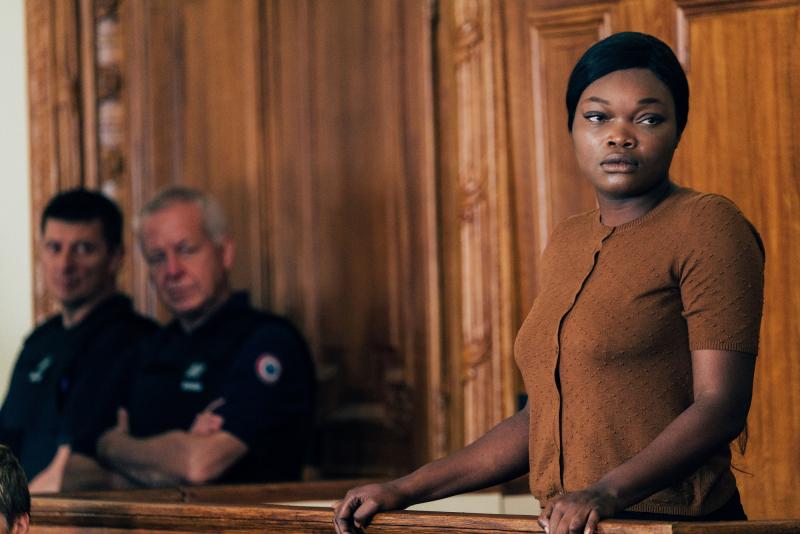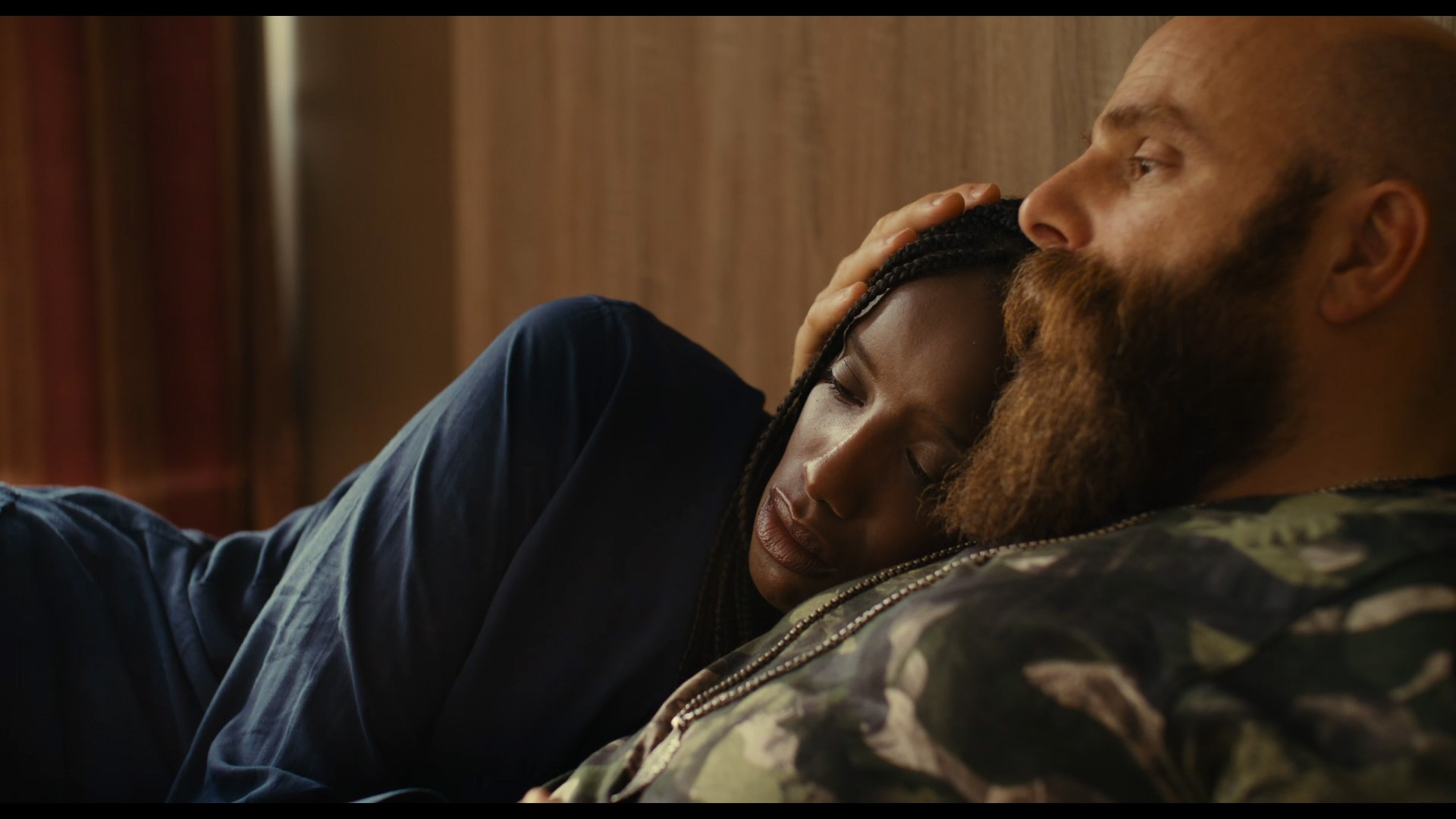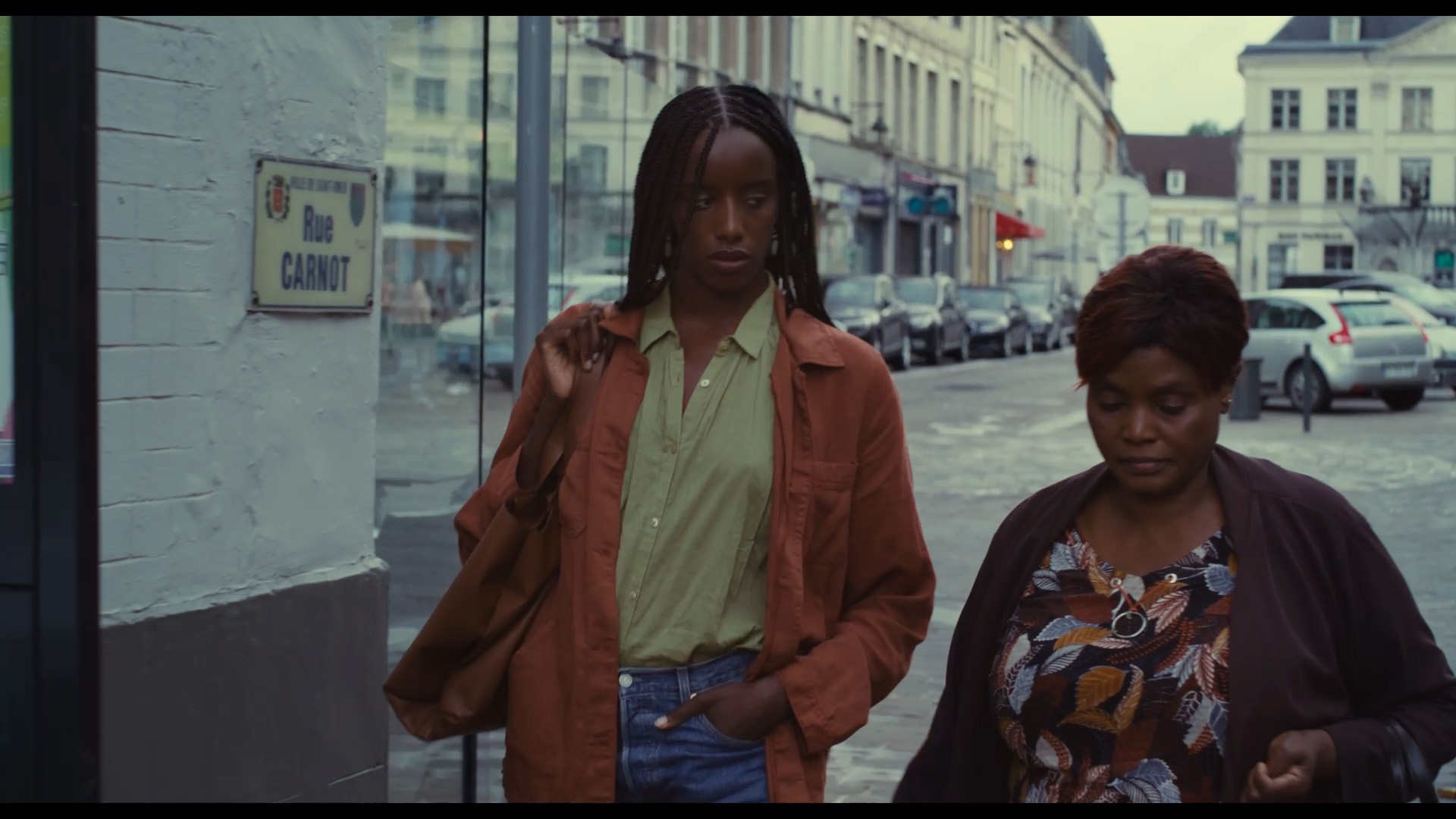Saint Omer review - exile and erasure | reviews, news & interviews
Saint Omer review - exile and erasure
Saint Omer review - exile and erasure
A migrant child-killer's guilt proves elusive in Alice Diop's courtroom meditation

Saint Omer is a psychological and sociological mystery, unpicking the enigma of Laurence (Guslagie Malanda), a French Senegalese woman who drowned her 15-month-old daughter in the ocean.
Director Alice Diop recognised her own Senegalese heritage and circumstance in the case of Fabienne Kabou, the murderer of a mixed-race child much like her own, who was racially pathologised in the French media. A prize-winning documentarian, Diop’s first feature adapts Kabou’s trial transcripts, and was filmed next-door to her courtroom in the depressed northern town of Saint-Omer.
We glimpse the Paris life of novelist and academic Rama (Kayije Kagame) with her Senegalese mother (weary) and sister (spiky), and her white musician boyfriend Luc (Xavier Maly, pictured below right with Kagame), a softly bear-like comfort. Then she takes the train to Saint-Omer to witness Laurence’s trial as Diop did Kabou’s, both envisioning artworks fuelled by Pasolini’s mythic Medea and filtered through Senegalese roots. Diop was jolted by Kabou’s icy, seeming psychopathy, warmed by Malanda in this fiction.
 Diop leaves so much unsaid for so long. She holds her camera on each character, framed by the court’s stately wooden panels, filling the screen with their presence. Laurence’s penetrating stare is wounded and accusing, with tremors of contained emotion. She turns towards the viewer at an angle, and nothing she says is quite straight. “I was not being ambiguous,” she tells the judge. “Some things we can’t be clear about. And if I was lying, I can’t know why.”
Diop leaves so much unsaid for so long. She holds her camera on each character, framed by the court’s stately wooden panels, filling the screen with their presence. Laurence’s penetrating stare is wounded and accusing, with tremors of contained emotion. She turns towards the viewer at an angle, and nothing she says is quite straight. “I was not being ambiguous,” she tells the judge. “Some things we can’t be clear about. And if I was lying, I can’t know why.”
Slights and incomprehension chip at her reality: a white professor belittles her college study of Wittgenstein, so distant from “her own culture”, and reporters marvel at this articulate black student; her Senegalese dad stopped financing her when she dropped law to dream of being a world-changing philosophe. Sorcery vies with madness to explain her exile’s murderous end.
Rather than just accuse French society, Saint Omer finds forms of solidarity. The trial’s bench is female bar the male prosecutor, honestly trying to weigh justice for a woman beyond their grasp, Rama’s heart opens at Laurence’s complicit glance and her lawyer’s empathy releases Laurence’s damped down tears. The script’s main addition to the real trial is a lawyer’s talk of “chimeric cells” shared between pregnant mother and child, suggesting infinite, sometimes fraught chains of female connection.
 Though Saint Omer follows theatre’s trend for court testimonies, its speeches feel deeply cinematic. Diop’s camera is as fixed as CCTV but far more artful. There is a quality of still concentration and accumulated empathy, absorbing the characters’ complex humanity. Street and hotel interludes broaden Rama’s wintry season in France’s provinces, and she daydreams, watching dust float and swirl, and stares idly at the court’s stone grandeur, representing a country which only shakily accepts her.
Though Saint Omer follows theatre’s trend for court testimonies, its speeches feel deeply cinematic. Diop’s camera is as fixed as CCTV but far more artful. There is a quality of still concentration and accumulated empathy, absorbing the characters’ complex humanity. Street and hotel interludes broaden Rama’s wintry season in France’s provinces, and she daydreams, watching dust float and swirl, and stares idly at the court’s stone grandeur, representing a country which only shakily accepts her.
Saint Omer is about the past haunting and bonding women, for good and ill, in a society which helped make Laurence a ghost to herself. It brings scars to the surface, to breathe and heal beneath her camera’s lingering, unjudgmental gaze.
rating
Explore topics
Share this article
The future of Arts Journalism
You can stop theartsdesk.com closing!
We urgently need financing to survive. Our fundraising drive has thus far raised £49,000 but we need to reach £100,000 or we will be forced to close. Please contribute here: https://gofund.me/c3f6033d
And if you can forward this information to anyone who might assist, we’d be grateful.

Subscribe to theartsdesk.com
Thank you for continuing to read our work on theartsdesk.com. For unlimited access to every article in its entirety, including our archive of more than 15,000 pieces, we're asking for £5 per month or £40 per year. We feel it's a very good deal, and hope you do too.
To take a subscription now simply click here.
And if you're looking for that extra gift for a friend or family member, why not treat them to a theartsdesk.com gift subscription?
more Film
 The Mastermind review - another slim but nourishing slice of Americana from Kelly Reichardt
Josh O'Connor is perfect casting as a cocky middle-class American adrift in the 1970s
The Mastermind review - another slim but nourishing slice of Americana from Kelly Reichardt
Josh O'Connor is perfect casting as a cocky middle-class American adrift in the 1970s
 The Perfect Neighbor, Netflix review - Florida found-footage documentary is a harrowing watch
Sundance winner chronicles a death that should have been prevented
The Perfect Neighbor, Netflix review - Florida found-footage documentary is a harrowing watch
Sundance winner chronicles a death that should have been prevented
 Blu-ray: Le Quai des Brumes
Love twinkles in the gloom of Marcel Carné’s fogbound French poetic realist classic
Blu-ray: Le Quai des Brumes
Love twinkles in the gloom of Marcel Carné’s fogbound French poetic realist classic
 Frankenstein review - the Prometheus of the charnel house
Guillermo del Toro is fitfully inspired, but often lost in long-held ambitions
Frankenstein review - the Prometheus of the charnel house
Guillermo del Toro is fitfully inspired, but often lost in long-held ambitions
 London Film Festival 2025 - a Korean masterclass in black comedy and a Camus classic effectively realised
New films from Park Chan-wook, Gianfranco Rosi, François Ozon, Ildikó Enyedi and more
London Film Festival 2025 - a Korean masterclass in black comedy and a Camus classic effectively realised
New films from Park Chan-wook, Gianfranco Rosi, François Ozon, Ildikó Enyedi and more
 After the Hunt review - muddled #MeToo provocation
Julia Roberts excels despite misfiring drama
After the Hunt review - muddled #MeToo provocation
Julia Roberts excels despite misfiring drama
 London Film Festival 2025 - Bradley Cooper channels John Bishop, the Boss goes to Nebraska, and a French pandemic
... not to mention Kristen Stewart's directing debut and a punchy prison drama
London Film Festival 2025 - Bradley Cooper channels John Bishop, the Boss goes to Nebraska, and a French pandemic
... not to mention Kristen Stewart's directing debut and a punchy prison drama
 Ballad of a Small Player review - Colin Farrell's all in as a gambler down on his luck
Conclave director Edward Berger swaps the Vatican for Asia's sin city
Ballad of a Small Player review - Colin Farrell's all in as a gambler down on his luck
Conclave director Edward Berger swaps the Vatican for Asia's sin city
 London Film Festival 2025 - from paranoia in Brazil and Iran, to light relief in New York and Tuscany
'Jay Kelly' disappoints, 'It Was Just an Accident' doesn't
London Film Festival 2025 - from paranoia in Brazil and Iran, to light relief in New York and Tuscany
'Jay Kelly' disappoints, 'It Was Just an Accident' doesn't
 Iron Ladies review - working-class heroines of the Miners' Strike
Documentary salutes the staunch women who fought Thatcher's pit closures
Iron Ladies review - working-class heroines of the Miners' Strike
Documentary salutes the staunch women who fought Thatcher's pit closures
 Blu-ray: The Man in the White Suit
Ealing Studios' prescient black comedy, as sharp as ever
Blu-ray: The Man in the White Suit
Ealing Studios' prescient black comedy, as sharp as ever
 The Woman in Cabin 10 review - Scandi noir meets Agatha Christie on a superyacht
Reason goes overboard on a seagoing mystery thriller
The Woman in Cabin 10 review - Scandi noir meets Agatha Christie on a superyacht
Reason goes overboard on a seagoing mystery thriller

Add comment